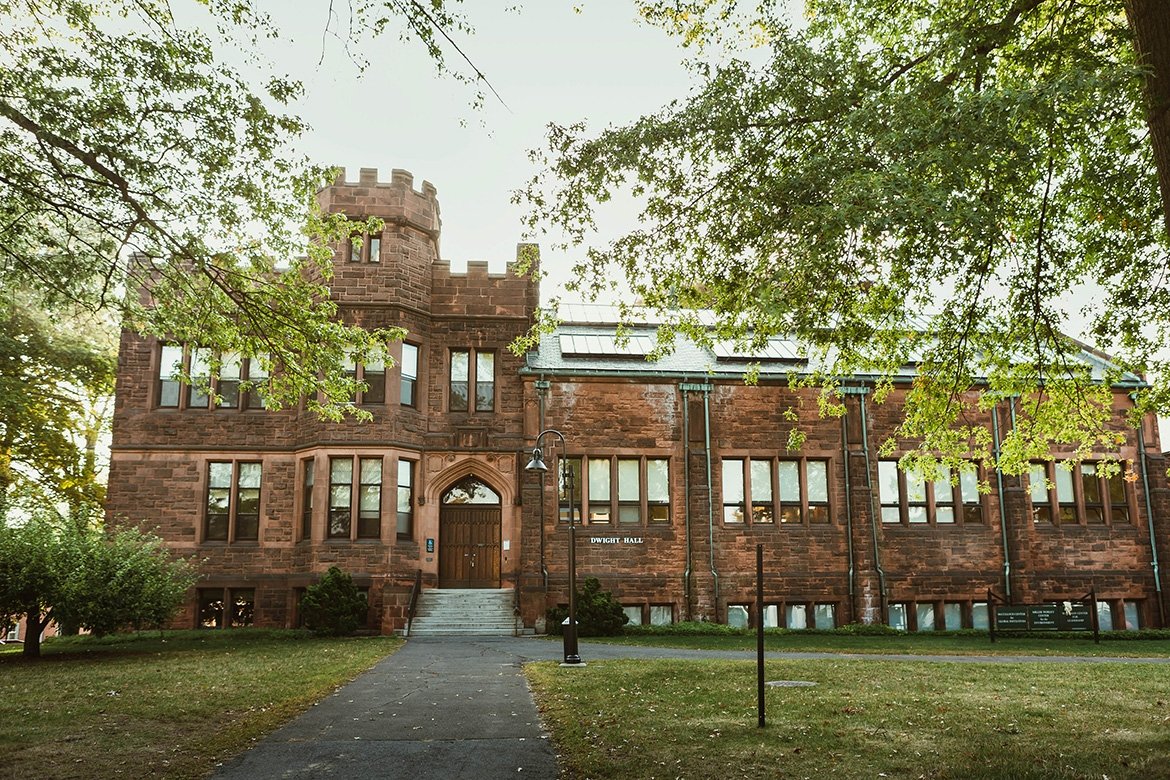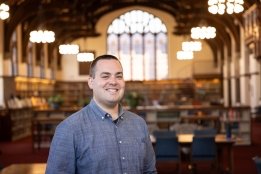Two students secure high honors for geographical research

Two Mount Holyoke College students took home awards from the 2024 New England and St. Lawrence Valley Geographical Society Fall Conference for their research on water scarcity in the Southwest and on the preservation of indigenous water systems in Nepal.
After working with the Students Tackling Advanced Research (STAR) Lab at the Department of Geology and Geography, Mount Holyoke College students Cameron Wehner ’25 and Asmi Shrestha ’26 have secured the two highest honors at the 2024 New England and St. Lawrence Valley Geographical Society (NESTVAL) Fall Conference. As the regional conference of the American Association of Geographers (AAG), more than 20 colleges and universities in the United States and Canada were represented.
The STAR Lab is the creation of Assistant Professor of Geography Dinko Hanaan Dinko and Associate Professor of Geography and International Relations Serin Houston. The lab encourages student excellence in geographic scholarship and research. Students involved in the program are completing independent research projects of their own design or working as research assistants for faculty. A significant focus of the program is professional development opportunities for students, including publications and conference presentations at conferences like NESTVAL.
“I’ve always wanted to provide a space where students could have the academic freedom to pursue their interests, regardless of the type of sciences they study,” Dinko said. “The STAR Lab provides that opportunity for students to get one-on-one mentorship. It provides the resources and the guidance in conceptualizing their research, how to get funding and in choosing the research design methods and how to articulate their problem.”
Wehner’s research, titled “Urban Expansion and Rural Contentions: The Political Ecology of Suburbanization and Water Scarcity in the American Southwest,” earned them the AAG Council Award for Outstanding Student Paper. This award recognizes exceptional contributions to geographical scholarship at the undergraduate level. Wehner, who is from Aurora, Colorado, says the motivation for their research came from personal experience.
“Growing up in Colorado and spending much time in rural areas working with horses, water scarcity is already extremely pertinent; to complicate drought with a population increase causes disruption not only ecologically but socially and politically as well,” Wehner said. “As population growth and development [are] destined to happen, I feel it is imperative that we pay attention to the political ecology of resource management.”
Wehner’s work will continue outside of NESTVAL, when they and other geography and international relations students travel to the 2025 AAG annual meeting in the spring.
“Resource scarcity is not a passive occurrence but rather is always inherently political. Further research outside of NESTVAL has examined the gendered and socioeconomic consequences of suburbanization and water scarcity as well,” Wehner said. “I am excited to present my research at the AAG in Detroit this spring.”
Mount Holyoke secured a double victory at the NESTVAL conference, thanks to research by Shrestha titled “Heritage That Hydrates: Analyzing the Hitis of Nepal Through the Lens of Urban Political Ecology.” Her work earned her the David Frost Undergraduate Student Research Presentation Award.
“Hitis, which are traditional stone water spouts, have been in use for about 1,500 years in Kathmandu,” said Shrestha, who is from the Nepalese capital. “Working for a travel magazine over my gap year, I came to realize that hitis were neglected on very different levels by the government, despite [their] status as something that was important to our cultural heritage.
“When we discussed indigenous water systems in Professor Dinko’s class, hitis came up. Realizing that hitis are so unheard of, even within the Kathmandu Valley, I wanted to contribute to their preservation in some way.”
Shrestha is hoping her research will encourage dialogue about using the stone water spouts for sustainable water management.
“Hitis are completely gravity fed, and they’re still working to supply drinking water to people in urban spaces, so without having to spend excessive money on raw materials, these systems have sort of preserved themselves and kept that system going,” Shrestha said. “Conversations like these can give people new ideas, and I hope to bring in more indigenous stories from Nepal to conversations within geography and even international relations, if possible.”
Dinko believes Wehner’s and Shrestha’s successes at the NESTVAL conference underscores the fact that Mount Holyoke offers student researchers an academic environment they can flourish in.
“These achievements highlight Mount Holyoke College’s commitment to fostering undergraduate research excellence and demonstrate the exceptional quality of student scholarship emerging from the STAR Lab,” Dinko said. “The success of these young researchers showcases Mount Holyoke College’s ability to prepare students for high-level academic discourse and research presentations at prestigious regional conferences.”
Support from the Department of Geology and Geography and the Miller Worley Center for the Environment and funding obtained through The Lynk initiative made Wehner’s and Shrestha’s research possible.
